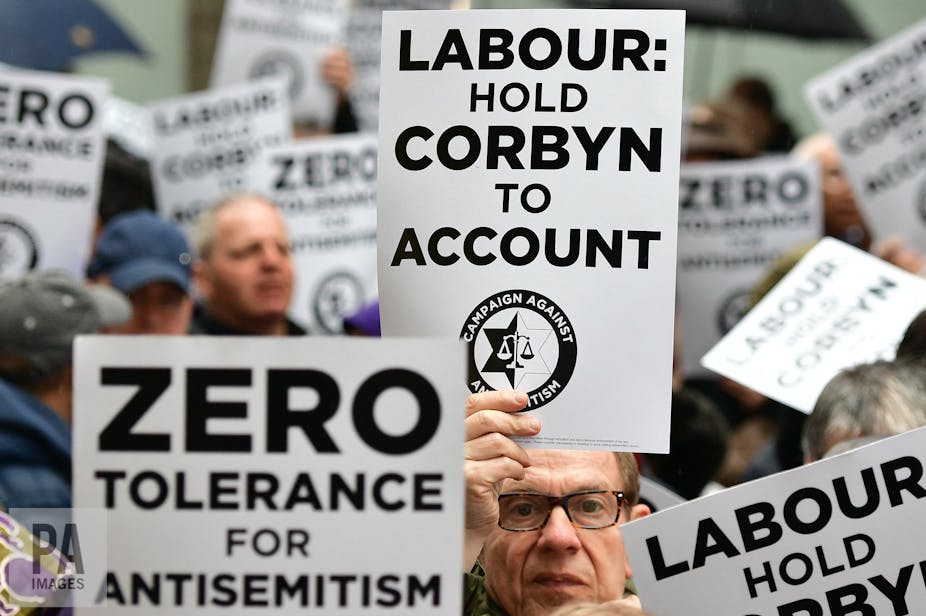The current crisis in the Labour party has exposed some profound fault lines on the left. Despite considerable evidence of mounting antisemitism inside the party, which finally provoked a major protest, some have responded with unabashed hostility.
Rather than taking the side of the overwhelming majority of Jews, and taking their obvious hurt and dismay seriously, some have charged them with dishonesty. They say they are exaggerating or inventing antisemitism where it does not or scarcely exists. They accuse them of manipulation and of conspiring against the leader of the party when he has every opportunity of rescuing the country from the disasters visited upon it by the Conservative government.
Beyond this, some have sought to explain away antisemitism as a consequence of the supposedly bad behaviour of Jews, in the form of the conduct and even the existence of the state of Israel, and the supposedly uncritical support given to it by Jews in Britain.
Leaving aside the obvious fact that many Jews in the UK are by no means uncritical of many of the policies of the Israeli government, the central problem with these responses is that they partake of some classic antisemitic tropes.
The idea that Jews are not to be trusted when they say they have been attacked, the charge that they engage in special pleading and that they plot and scheme together for malign purposes, have long formed staples of antisemitic discourse. Historically, they have been central to the idea that there is a “Jewish Question” which somehow must solved – either by Jews behaving better (ideally by ceasing to be Jews) or (if they will not do so) by getting rid of them.
The ‘Jewish Question’
The far right was the most radical in its enthusiasm to solve the “Jewish Question” through the Holocaust but the notion that there is such a question has been shared by some on the left, too. It was first formulated in the modern world in the Enlightenment.
Some thought that there was something peculiarly problematic about Jews. This was not just their particular religion (seen as worse even than Christianity which at least had the virtue of making a universalist claim) but their behaviour and particular identity (as a “nation within a nation”). Even some of those who thought that Jews should now be included and given rights did so conditionally. The rights should be given on the basis that their supposedly “bad” behaviour should improve and their loyalties to each other be abandoned. If not, the door was left open to the possibility that Jews should be got rid of.
As antisemitism developed into an ultimately genocidal ideology, the persistence of the notion of a “Jewish Question” helped shape the response to it among some on the left. To them, antisemitism was somehow understandable because of the way Jews supposedly behaved, and that antisemitism might even be harnessed to the socialist cause, since antisemites were laying the blame for the evils of capitalism on Jews. This has been described as the “socialism of fools” (not that helpful a formulation actually insofar as it suggests antisemitism is still some kind of socialism).

During and immediately after the Holocaust this way of thinking played its part in the reluctance of some to prioritise solidarity with Jews or to recognise the catastrophe that had befallen them. Worse, it helped shape a new form of Stalinist antisemitism in the communist bloc. Jews were violently attacked for their supposed disloyalty and treachery to the cause.
It was then that key elements of the latest reformulation of the “Jewish Question” were developed – in the form of an antizionism. This way of thinking focuses obsessively on Israel, where, not coincidentally, large numbers of Jews now live after the catastrophe that nearly destroyed the whole group. This state is regarded by some as uniquely evil. It is guilty of the worst of all crimes – of genocide, crimes against humanity and apartheid – and is the gravest threat to world peace. Once again, Jews have supposedly failed the test for inclusion in the modern world, now in the form of the world of legitimate nation states.
There has always been, on the left, another way of thinking – not about an imagined “Jewish Question”, but about antisemitism. From this perspective, the problem is not, and never has been, the behaviour, identity or religion of Jews, which is no worse than that of other groups. The problem is a view of the world which projects all the problems of society (at the national or international level) onto Jews.
It’s a view which not only fails to grasp the threat posed by antisemitism but condones and colludes with it. It’s a view that others (sadly) on the left need to challenge. They need to reject the whole idea of a “Jewish Question” in favour of an elemental and principled solidarity with Jews as they come under attack once again.

